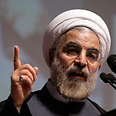
US says willing to relieve sanction if Iran takes 'first step'
Senior White House official says US wants Islamic republic to agree to stop nuclear program in this week's talks. Gallup survey indicates most Iranians support nuclear program despite suffering sanctions.
The United States wants Iran to agree in negotiations this week a "first step" that stops its nuclear program advancing further and starts reversing parts of it, a senior administration official said on Wednesday.
In return for such a move, Washington would be willing to offer Iran "very limited, temporary, reversible sanctions relief," the official said, giving no detail on what those measures might be.
Related stories:
- Rohani not 'optimistic' about nuclear talks
- Hagel: Sanctions, Israeli pressure brought Iran to table
- Top Iran lawmaker: 20% uranium enrichment continues
The official was speaking on the eve of the two-day talks between Iran and six world powers in Geneva that seek to build on a diplomatic opening created by the election of relatively moderate Hassan Rohani as Iran's new president in June.
"What we're looking for is a first phase, a first step, an initial understanding that stops Iran's nuclear program from moving forward and rolls it back for first time in decades," the official told reporters.
This phase must involve levels of Iran's uranium enrichment, its stockpiles of the material as well as international monitoring, the official said.
"We're looking for ways to put additional time on the clock," the administration official added.
Such a first step by Tehran, which denies seeking the capability to make nuclear weapons, would create space for further negotiations on a comprehensive settlement, the official said.
Iran says it is enriching uranium for peaceful energy and medical purposes only. But its refusal to curb sensitive nuclear activity that can also have military applications has drawn sanctions, damaging its oil-dependent economy.
'Bad deal'
Israel on Wednesday called on major powers to reject any proposal to reduce Iran's controversial nuclear program in exchange for an easing of Western sanctions.
Iran and the 5 +1 group (the United States, Russia, China, UK, France and Germany) will be in Geneva Thursday to negotiate the terms of an agreement on the nuclear issue. Iran government said an "outline" to the agreement is possible this week.
"Over the last few hours, Israel has learned that a proposal would be made to the 5 +1 in Geneva that Iran will stop all enruchment activities at 20% and slow down work on its heavy water reactor, in exchange for an easing of sanctions," an Israeli official told AFP.
"Israel believes that it is a bad deal and strongly opposes it," the official said, speaking on condition of anonymity.
"The analysis in Israel is that the 5 +1 are in a position of strength. The sanctions are hurting Iran and it feels the pressure, and the 5 +1 have the ability to use that pressure to force Iran to end all enrichment and stop construction on the reactor," the official said.
Report: Iranians support nuclear program
A Gallup survey, conducted in Iran in December 2012 and released Wednesday, revealed that 56% of Iranians reported that sanctions imposed by the United Nations, the US and Western Europe have hurt Iranians' livelihoods a great deal. Some 29% noted sanctions have hurt somewhat.
Despite these data, the survey indicated that 63% of Iranians believe that Tehran should continue to develop its nuclear program. According to Gallup, this is a sign of a strong Iranian nationalistic sentiment growing as a result of the huge international pressure on the country.
Gallup stressed that when the question was phrased differently, Iranian expressed lower support in the nuclear program: When asked if they "support" their country's strive for nuclear ability without regard to the conflict with the West, 56% of Iranians backed a non-military nuclear program, with only 34% supporting a race for military nuclear ability.
According to the poll, Iranians consider the US as responsible for the sanctions against them. One out of ten Iranians considers the Iranian government to be at fault. Only 9% consider Israel responsible for the sanctions, and 6% blame the Western European countries. Some 16% of Iranians say they have no opinion in the matter; the survey polled 4,507 Iranians aged 15 and up.
The survey was published as the negotiations between Iran and the West were underway, and as US and Europe expressed hope for a peaceful end to the Iran nuclear program. Iran has made it clear that its main goal is to remove sanctions, which include a ban on gas and a prohibition on trade with Iranian companies. The sanctions caused a dramatic rise in prices and a severe weakening of the Iranian currency.
Prime Minister Benjamin Netanyahu has been continuously warning the West from succumbing to what he referred to as the Iranian stunt, imploring the US not to allow Iran to use the talks as means to stall as it develops a nuclear bomb.
Last week, the US government asked Congress to avoid approving further sanctions against Iran, so as not to hurt trust between the negotiating teams. Netanyahu, on the other hand, is calling for more sanctions, and insists the West must use Iran's current weakness to disarm it of a nuclear program completely.
Meanwhile, Noble Peace Prize laureate Shirin Ebadi critized Iranian president Hassan Rohani Wednesday, saying a rise in executions and deterioration in human rights in Iran followed his taking over the presidency. According to Ebadi, Rohani is ignoring his promise to improve human rights in Iran.
- Receive Ynetnews updates directly to your desktop










